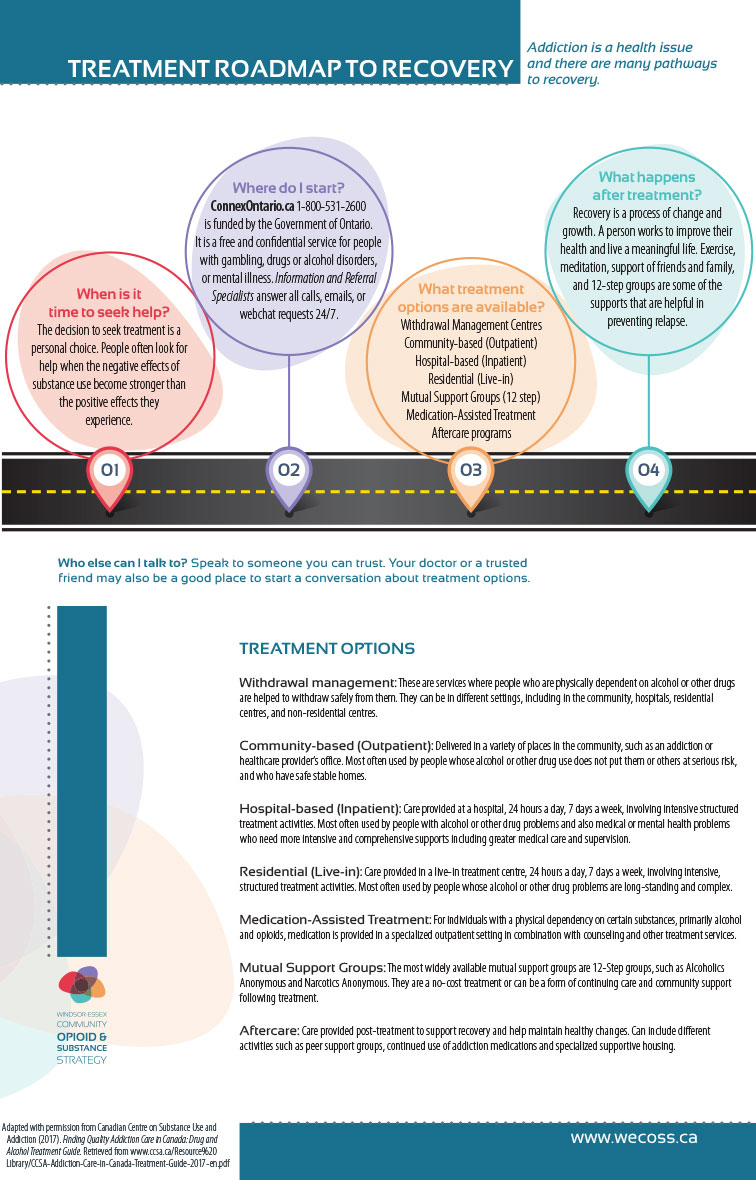The parts include the following: Detoxing and medical management of withdrawal symptoms, if required; a comprehensive evaluation of the nature of usage, and strengths and needs of the person which results in a diagnosis; an individualized treatment strategy which is developed with the client and is customized as the individual progresses; pharmacological treatment, when proper; monitoring of ongoing abstaining from alcohol and/or other substances; professional and educational assistance; cognitive and behavior modification; scientific case management; continuing care; and self-help or peer support as a complement to professional treatment (why drug addiction is not a disease).
Although addiction treatment service provider need not offer all services straight, quality care then requires that services be prepared for and offered through recommendation linkages with other properly certified suppliers. The treatment delivery procedure assures that all needed and available services are provided to address people' requirements relating to addiction. Other issues that may be dealt with in an extensive treatment procedure, in addition to addiction management, include physical health, mental health, strengthening the family, legal, monetary, childcare, real estate, parenting, transport, education, prevocational and work preparedness. Prior to commencing with treatment, you will go through an consumption evaluation from an addiction therapist or psychological health expert. This assessment will take into consideration self-reports of compound abuse, medical records, urine screening, blood testing, and more. The person will gather as much info as possible relating to:1 Patterns of drug or alcohol abuse.
Mental status. Physical problems or conditions. Important signs, such as high blood pressure. Past detox or rehab experiences. Living conditions, monetary scenario, and legal status. Violence or suicide danger. Cognitive, sensory, or physical impairments. The individual conducting the evaluation will use this information to assist create an individualized treatment plan customized to fit your requirements.

Group therapy. Peer assistance meetings, such as Twelve Step Programs (AA) or Narcotics Anonymous (NA). Household therapy sessions. Additional services or activities, such as yoga, exercise and dietary counseling, meditation and mindfulness, acupuncture, or day spa treatment. Medication management, if suitable. Relapse avoidance education. Aftercare planning. Private treatment will help you discover to recognize triggers and deal with them.
Group counseling offers you with the chance to practice sober social skills, as well as the coping methods you discovered in individual therapy. Household therapy sessions can assist to fix damaged relationships, improve communication abilities, and construct dispute resolution skills. Medication, such as methadone or Suboxone, may be used in combination with behavioral treatment to assist opioid-addicted people stay abstinent.
The 8-Minute Rule for Allen Who Has A Drug Addiction Problem
Ongoing support may consist of specific therapy, group counseling, self-help group meetings (e. g., 12-step, CLEVER Recovery), alumni programs, or sober living homes. 1,2 You'll want to be comprehensive while looking for the compound abuse treatment program that is right for you. Not all rehabilitations are equivalent, so it is essential that you understand what you're searching for.
Suitable education, experience, and accreditations for personnel Mental Health Facility members. Personalized treatment plans. Ongoing re-evaluations of treatment plans. Aftercare/relapse prevention preparation. Evidence-based therapeutic interventions. Experience in treating your specific addiction. Experience in dealing with addiction and a co-occurring mental health condition, if required. Compassionate, nonjudgmental, compassionate personnel members. Staff trained in cultural level of sensitivity.
For circumstances, some individuals choose faith-based rehabs if their religion is important to them. Others may choose to register in a holistic treatment center that makes use of alternative and complementary practices, such as acupuncture, meditation, and yoga. Regardless of the treatment program you choose, it's essential to validate that it has those qualities.
Clients dedicate to themselves and their enjoyed ones that they will make every effort to make a favorable modification in their lives. They make long-term objectives and after that short-term goals that assist them along the way. To help patients conquer denial and make healthy options and commitments, physicians educate them on the repercussions and effects of substance abuse and dependency.
Drug rehab treatment centers provide regular private counseling to patients. These counseling sessions often even happen on a daily basis. Therapists assist clients discover any psychological or mental elements that might have contributed to their addictions. It is necessary that these mental aspects are resolved if a client is to make a complete recovery.
How To Get Help With A Drug Addiction Fundamentals Explained
Patients with comparable dependencies meet Drug and Alcohol Treatment Center together under the instructions of a therapist. This permits them to form relationships and to have fellowship with one another. These close individual bonds help clients on their roadway to recovery. Clients in drug rehab discover to acknowledge circumstances that might trigger substance abuse. These triggers could be emotional, physical, part of relationships, or just part of their normal regimens.
When patients find out to recognize substance abuse triggers, they learn the skills required to cope with them. Counselors and physicians in drug rehab treatment facilities deal with each client to come up with a customized set of coping skills that the client can use to avoid him or her from turning to drugs.
This might include changing pastime or even altering elements of a person's career or daily life. The objective is to minimize the amount of stress and activates in the patient's life to keep him or her from falling back. Program choices before and after treatment In 2016, Healing Brands performed a survey asking patients leaving a recovery treatment program what clinic qualities they saw as high priority elements to examine when taking a look at a program.
They also valued center offerings (facilities, comforts, quality of housing, etc.) much more after finishing from treatment. Individuals searching for treatment will wish to take a look at a center's monetary policies as well as the program's offerings to help in their last program choice. Find out more Medications are utilized for 2 various reasonsto manage intense withdrawal symptoms and cravings and to preserve abstaining as soon as withdrawal has actually Rehabilitation Center solved.

In some instances, as soon as you attain medical stability and are drug-free, you might start a regimen of upkeep medications. Only specific dependencies can be treated with medication. These consist of opioids, such as heroin and prescription painkillers, and alcohol. The commonly-used medications consist of:1,2,3 Methadone: A complete opioid agonist that minimizes heroin and prescription pain reliever cravings and helps to promote long-lasting sobriety.
All about When Did Drug Addiction Become A Disease
This medication likewise reduces cravings connected with opioids. The addition of naloxone hinders abuse of buprenorphine. Naltrexone: This medication blocks the results of opioids in the brain, negating the fulfilling and enjoyable sensations associated with opioid abuse. This helps to discourage opioid usage. Naltrexone can likewise be utilized to deal with alcoholism.